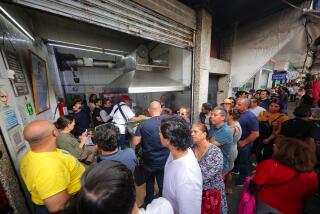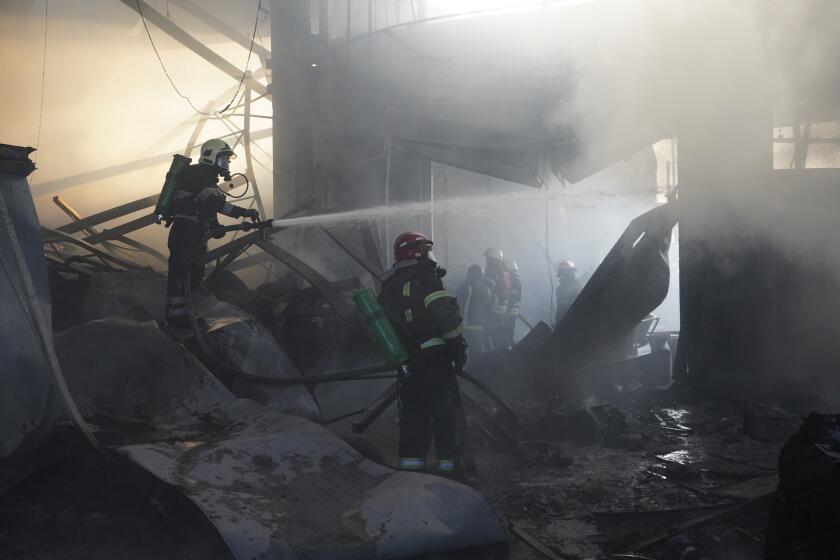Israel Shuts Crossings, Vows Reprisal After Bombing
Israel imposed a strict closure on the West Bank and Gaza Strip on Tuesday and vowed to target Islamic Jihad militants after a suicide bombing that killed five Israelis and wounded more than 40 people outside a shopping mall.
By Tuesday morning Israeli forces had arrested 14 wanted Palestinians, most of them in an area of the northern West Bank that is a center of Islamic Jihad activity and the origin of the assailant who blew himself up in the coastal city of Netanya on Monday morning. Nine of the 14 suspects were believed to be Islamic Jihad members, military officials said.
Early today, Israeli troops arrested three more Palestinians in the West Bank, Israel Radio reported.
Those arrested Tuesday included the father and a brother of the 21-year-old bomber in the village of Ilar, about five miles northeast of Tulkarm, army officials said. The two are members of Islamic Jihad, the military said.
Palestinian authorities said they had arrested seven members of Islamic Jihad in the West Bank as part of their investigation into the bombing. Palestinian Authority President Mahmoud Abbas, who condemned Monday’s attack, said his security forces would seek to bring to justice any others involved.
But Israeli officials said the arrests by the Palestinians did not go far enough.
“It’s a start. But it’s clear that responsive actions, sporadic actions alone, are not going to deal with this issue,” said Mark Regev, spokesman for the Israeli Foreign Ministry. “You have to disarm.”
Israel has criticized Abbas and his government for failing to act forcefully enough against armed groups, and its latest threats of a sweeping offensive against Islamic Jihad appeared partly an effort to prod Palestinian authorities into action.
Israeli military officials said their forces would vigorously pursue suspected militants of Islamic Jihad through arrests and targeted killings of its leaders. In addition, Israel vowed to continue launching airstrikes on the Gaza Strip to combat rocket attacks on southern Israel.
During the last two months, Israel has killed several Islamic Jihad activists and arrested many more in the West Bank and Gaza. But after Monday’s attack, Israeli officials warned of stepped-up reprisals against the hard-line group, which is relatively small but has carried out attacks against Israelis despite an informal cease-fire declared by other Palestinian militias.
An Israeli military official said commanders were also weighing whether to fire artillery into populated areas of the Gaza Strip from which fighters launch Kassam rockets.
Thus far, Israel has lobbed shells into fields used as launching pads but refrained from firing into neighborhoods where bystanders might be hit. The Haaretz newspaper reported that the military was preparing plans under which Gaza residents would be warned by loudspeaker to leave a targeted area.
During a Cabinet debate last year, Atty. Gen. Menachem Mazuz warned that firing artillery indiscriminately into densely populated areas would constitute a war crime, Israeli media reported.
Israel’s response to the Netanya attack comes during the early stages of Israeli and Palestinian election campaigns. Journalist Alex Fishman, writing in the daily newspaper Yediot Aharonot, cautioned against taking retaliatory measures that might win votes at home but could harm many ordinary Palestinians, who will elect a new parliament next month.
In that race, the dominant Fatah movement, led by Abbas, faces a potent challenge from Hamas, an Islamic militant group that rejects Israel’s right to exist. “In the present situation, collective punishment will indeed add seats -- but mainly to Hamas,” Fishman wrote. Israeli elections are scheduled to take place March 28.
The Israeli military gave no time limit for the closure, which bars nearly all Palestinians from entering Israel to work, visit or conduct business.
The day before the bombing, Israel had eased travel restrictions to allow more Palestinian workers and merchants into Israel. About 9,000 Palestinians from Gaza entered through the Erez crossing to work or conduct business Sunday under the relaxed rules. The new restrictions apply to all but diplomats and humanitarian workers.
More to Read
Start your day right
Sign up for Essential California for news, features and recommendations from the L.A. Times and beyond in your inbox six days a week.
You may occasionally receive promotional content from the Los Angeles Times.





